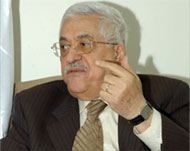Hamas to rely on Muslim funds
Ismail Haniya, set to be named Palestinian prime minister, has said that a Hamas government would rely on help from the Muslim world if the West acts on threats to axe funds once it takes office.

In an interview with AFP at his home in Gaza City’s Shaati refugee camp, Haniya also said Hamas, set to form their first government after a landslide election win last month, would work constructively with Mahmud Abbas, the Palestinian president, and address the pervading financial and security chaos.
The victory by Hamas, the resistance movement behind dozens of attacks against Israel in a five-year intifada (uprising), has led both the European Union and United States to warn of a cut in funding unless it renounces violence and recognises the Jewish state.
Transparency promised
Haniya, a softly-spoken former university administrator who headed Hamas’s list of parliamentary candidates, said the Islamist movement was well placed to do a better job of government than its predecessors from Fatah.
“Firstly, by establishing a sound and transparent financial base, we will be able to make many economies,” said Haniya, seated underneath a giant portrait of Hamas founder Shaikh Ahmad Yassin, assassinated by Israel two years ago.
“Secondly, we think that the Arab and Muslim countries, at both an official level and among the members of the public, do not want to abandon us,” he added in response to questions about the threats to cut funds.
Haniya said that “international institutions, such as the World Bank, have assured us that they will maintain the finances of projects which they are supervising in the Palestinian territories”.
Iran visit
The possibility of a funding cut has raised speculation that Hamas could turn to Iran, one of its main diplomatic allies, to plug the finance gap.
 |
|
In January, Hamas attained a |
Haniya said that a Hamas delegation would travel to Iran shortly as part of a tour of Arab and Islamic countries.
This delegation, which has already visited Egypt, Qatar and Turkey “would also visit Iran, Malaysia and South Africa”.
Although Haniya stopped short of confirming he would be named premier, Hamas sources said the 43-year-old was “the strongest candidate”.
Haniya himself said the head of the government “will be from the Gaza Strip” and Hamas would hold “discussions with other parliamentary groups” about joining a coalition after the inaugural session of the parliament on Saturday.
“We want a national coalition government, including independents,” he said.
Relations-building
Haniya played down any prospect of clashing with the moderate Abbas (also known as Abu Mazen) whose Fatah movement was trounced by Hamas on 25 January.
 |
|
Hamas is determined to build |
“We are determined to build relations with Abu Mazen based on dialogue and cooperation and he has assured us that our government will enjoy the same prerogatives of the outgoing cabinet,” said Haniya.
“We will resolve any differences through dialogue and according to the law,” he added.
Under the terms of the basic law, Abbas retains control of issues such as relations with Israel. The moderate leader has already insisted he will continue working towards a negotiated settlement with Israel.
Hamas, although it has held off attacks for over a year, remains committed to Israel’s destruction and refuses to renounce the use of violence.
“As long as the occupation continues, our people will have the right to defend themselves,” Haniya said.
Security chaos
|
“What matters to us, are the interests and the rights of our people. They (the Israelis) should recognise the rights of the Palestinian people” Ismail Haniya, |
Questioned about the security chaos in the Palestinian territories which played a large part in Fatah’s defeat, Haniya said the crisis was “at the top of the agenda” of a Hamas government.
“We are going to resolve this through dialogue and inter-Palestinian understandings,” he said.
Ehud Olmert, the acting Israeli prime minister, campaigning for his own election on 28 March, has said he will stop paying customs duties to the Palestinian Authority once Hamas takes the helm of government and ruled out any contacts.
Haniya, however, refused to be drawn on his view of Olmert or the prospects for the Israeli general election.
“What matters to us, are the interests and the rights of our people. They (the Israelis) should recognise the rights of the Palestinian people.”